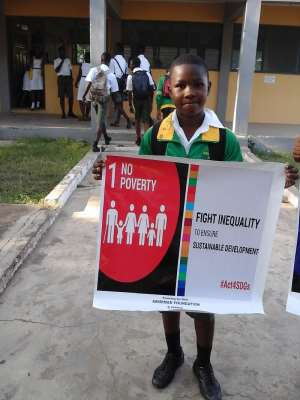
Today, on 17 October 2017 – the International Day of Eradication of Poverty - the Global Call to Action Against Poverty (GCAP) demands serious measures against inequalities in order to eradicate poverty by 2030.
The global community agreed to end poverty by 2030. We have the means to do this, if we create a more equal distribution. There is enough wealth. Only a small group of the super rich – the 1% richest and in many countries quite a few people - are grabbing the resources for themselves. This trend is even more extreme at the global level with a group of a few dozen men taking wealth away from the people through multinational corporations.
To do this they are using neoliberal policies since the 1970s, and, in the last years, more and more other political strategies to influence governments and media. Populist movements are often bankrolled by rich backers and used to create scapegoats and further right-wing policies and views. In addition, the space of civil society is shrinking in many countries.
As a result, social injustice is increasing and hunger is returning. In September this year, the UN Food and Agriculture Organisation (FAO) announced that after a steady decline in the number of people going hungry, it has increased again - 815 million people suffered from hunger in 2016, 38 million more than 2015!
The Agenda 2030 of the UN creates an opposite framework that aims to bring radical and transformational changes for people and the planet. On the Global Day of Action, 25 September 2017 – the two-year anniversary of the Agenda 2030, people organised and gathered in more than 1000 events in 116 countries and demanded action to achieve the Sustainable Development Goals (SDGs).
Marginalized people spoke for themselves on this Global Day of Action and are also raising their voices in many local and national struggles. To make sure that Leave No One Behind doesn’t become a slogan but reality, GCAP is continuing its bottom up campaign against inequalities.
The central element of the campaign is the “Faces of Inequality”, where people speak for themselves, including, for example, women with double or multiple discriminations. These women who have disabilities (over 600 million) or are ethnic minorities and Dalits (430 million) have powerful voices and are more and more organised. They need the political space – including in civil society.
Based on this work by GCAP’s coalitions at the local and national levels, we are demanding the following steps to eradicate poverty and fight inequalities:
- Social protection for all: More than 70% of the world’s population lacks proper social protection. By 2030, 100% coverage is needed to achieve the SDGs.
- Tax justice: There should be progressive taxation of multinational companies and the rich to reduce the rising gap between rich and poor and to fund social protection systems.
- Women’s and girls’ rights: 70% of the world’s poor are women and girls and 35% of women have experienced sexual violence. Equal access to resources and basic amenities like health and education should be ensured, plus laws to end all forms of discrimination and violence on women and girls ought to be enacted and implemented.
- Political participation and ensuring the freedom of civil society: People living in poverty often belong to excluded groups and they must be included in the process of decision making. Civil society is there to build this connection between citizens and the state. Freedom for expression and action are pre-requisites to eradicate poverty, and the rising repression of civil society across the globe must be reversed.
That is why on 17 October we are raising our voices again to reiterate our commitment to a world with less inequalities and our determination to eliminate poverty by 2030.




 Avoid pre-registered SIMs, buyer and seller liable for prosecution – Ursula Owus...
Avoid pre-registered SIMs, buyer and seller liable for prosecution – Ursula Owus...
 Election 2024: Mahama has nothing new to offer Ghanaians, Bawumia is the future ...
Election 2024: Mahama has nothing new to offer Ghanaians, Bawumia is the future ...
 OSP files fresh charges against ex- PPA Boss
OSP files fresh charges against ex- PPA Boss
 Withdraw unreasonable GH¢5.8m fine against former board members – ECG tells PURC
Withdraw unreasonable GH¢5.8m fine against former board members – ECG tells PURC
 Akroma mine attack: Over 20 armed robbers injure workers, steal gold at Esaase
Akroma mine attack: Over 20 armed robbers injure workers, steal gold at Esaase
 Those who understand me have embraced hope for the future — Cheddar
Those who understand me have embraced hope for the future — Cheddar
 Ghana will make maiden voyage into space should Bawumia become President — Chair...
Ghana will make maiden voyage into space should Bawumia become President — Chair...
 Train crash: Despite the sabotage, we shall not be deterred and will persevere —...
Train crash: Despite the sabotage, we shall not be deterred and will persevere —...
 Tema-Mpakadan railway project a perversion of the original viable concept design...
Tema-Mpakadan railway project a perversion of the original viable concept design...
 Train crash: Elsewhere, everyone involved in the test will either be fired or re...
Train crash: Elsewhere, everyone involved in the test will either be fired or re...
